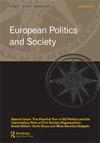政治叙事、欧盟集体安全和国情咨文
Q1 Social Sciences
引用次数: 0
摘要
本文章由计算机程序翻译,如有差异,请以英文原文为准。
Political narrative, collective EU security and the State of the Union
ABSTRACT The EU has always struggled to convince its member states for more security powers. The European Commission Presidents often use the State of the Union address to build a narrative on the need for the European Union to become a security player. The State of the Union address was established with the Lisbon Treaty and serves to highlight the priorities of the Commission. This makes it one of the most important addresses in political terms. Such a speech draws attention to the function of narratives and their role in shaping human communication which can be used by politicians to transfer ideologies, beliefs and information to a wider audience [Shenhav, S. R. (2005). Concise narratives: A structural analysis of political discourse. Discourse Studies, 7 (3), 315–335. https://doi.org/10.1177/1461445605052189; Della Sala, V. (2018). Narrating Europe: The EU’s ontological security dilemma. European Security, 27(3), 266–279. https://doi.org/10.1080/09662839.2018.1497978]. This paper will evaluate issues of security as tackled in the State of the Union addresses from the first delivered by Jose Manuel Barroso in 2010 to the last speech delivered by Ursula von der Leyen in 2021. This will serve to evaluate the evolving narrative concerning European Security as the Commission attempted to build a stronger case for transforming the EU into a security player.
求助全文
通过发布文献求助,成功后即可免费获取论文全文。
去求助
来源期刊

European Politics and Society
Social Sciences-Political Science and International Relations
CiteScore
4.20
自引率
0.00%
发文量
35
期刊介绍:
The editors of European Politics and Society welcome the submission of high quality articles on all aspects of European Politics, widely defined to include, comparative politics, political sociology, social policy, international relations, security, and modern history. The geographical scope of the journal covers all parts of Europe including the Russian Federation. The Journal also welcomes proposals for special thematic issues. For further guidelines on submission of special issue proposals, please see the Instructions for Authors page. All articles will be subject to a rigorous double-blind peer review process by a minimum of two referees.
 求助内容:
求助内容: 应助结果提醒方式:
应助结果提醒方式:


